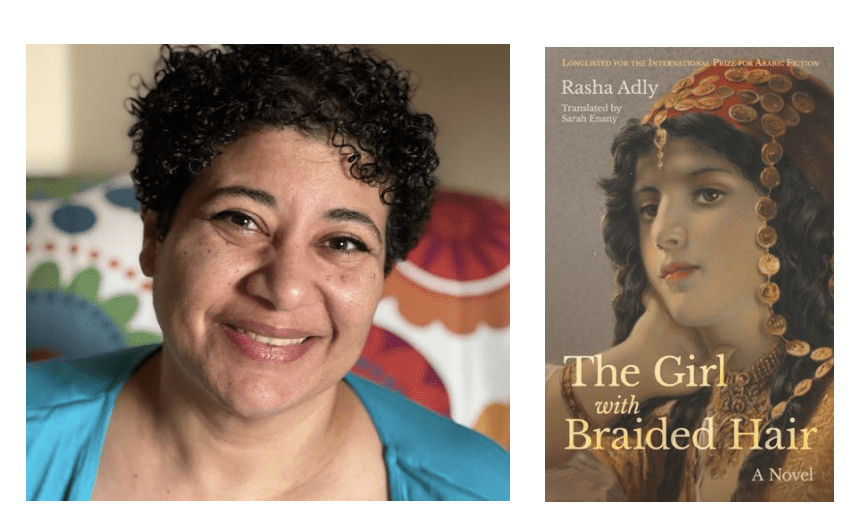Sarah Enany Wins 2021 Banipal Translation Prize for ‘The Girl with Braided Hair’
JANUARY 12, 2022 – Organizers announced today that Sarah Enany has won the 2021 Saif Ghobash Banipal Prize for Arabic Literary Translation for her translation of Rasha Adly’s novel The Girl with Braided Hair. The novel — titled شغف (Passion) in Arabic — had also been longlisted for the 2018 International Prize for Arabic Fiction. It was published by Hoopoe Fiction.

The novel, chosen from among a shortlist of five, was unanimously selected for the £3,000 prize, organizers said. The award is set to be officially granted by the Society of Authors at an online ceremony set for February 10 of this year.
This year’s panel of judges was chaired by translator and scholar Roger Allen, who was joined by publisher Rosemarie Hudson, scholar Ronak Hosni, and foundation director Caroline McCormick.
Enany’s translation won out over a wide range of accomplished novels, including Marilyn Booth’s translation of Hoda Barakat’s بريد الليل, re-titled as Voices of the Lost; Sawad Hussain’s translation of Shahla Ujayli’s A Bed for the King’s Daughter; Elisabeth Jaquette’s translation of Dima Wannous’s The Frightened Ones; and Jonathan Wright’s translation of Hassan Blasim’s God99.
The judges said, in their report:
This year’s winner of the Saif Ghobash Banipal Prize is Rasha Adly’s novel Shaghaf (Passion), superbly translated into English by Sarah Enany as The Girl with Braided Hair. Dedicated by its author “to everyone who has been defeated by life or had their dreams broken”, it is a wonderful combination of art and history, of contemporary Egypt and its 18th-century past, as it recounts the stories of two women. In the modern era, Yasmine embarks on some research in order to find out the history of a painting of a beautiful woman, that is unsigned and that she is helping to restore. After a good deal of research, it turns out to be the work of Alton German, a French artist and writer who accompanied Napoleon on his invasion of Egypt in 1798.
In this narrative, skilfully segmented into its two time frames, the reader is taken back to the earlier period and provided with both a vivid picture of the ruthlessness of the French invasion and, reflecting the original Arabic title, the infatuation that the painter feels for Zeinab, the subject of his painting. Zeinab, the lovely daughter of a prominent sheikh at the Al-Azhar Mosque in Cairo, has attracted the attention of Napoleon himself and risks alienation from her own family by responding to the flattering attentions of such foreigners and their very different cultural values and behaviour.
The judges were all impressed by the skill with which the author dexterously combines history, art, passion, and politics in the different but connected stories of these two Egyptian women, each story line being subdivided into multiple segments, frequently prefaced by specific dates, whether 1798 or 2012. The resulting narrative – a multi-textured story of love, war, and the ruthlessness and privileges of the invader – draws the reader into its two eras and worlds, as the quest for information about the portrait and its artist is interspersed with historical detail about Napoleon’s invasion and its impact on Egypt, Cairene society, and on Zeinab herself. The subtle and beautifully crafted translation faithfully echoes the style of the author.
In a news release from AUC Press, translator Sarah Enany said that she was “thrilled that my The Girl with Braided Hair has won this year’s prestigious Saif Ghobash Banipal Prize. I’m very grateful to Hoopoe Fiction and the AUC Press for giving me this opportunity, and to the judges for their kind words about the translation. I hope this award will encourage English-language readers to enjoy this richly detailed and poignant novel.“
Enany is both a literary translator and a professor at Cairo University. She has translated a number of novels, including Kamal Ruhayyim’s historical trilogy about identity and religion in twentieth-century Egypt, Diary of a Jewish Muslim (2014), Days in the Diaspora (2012), and Menorahs and Minarets (2017). She also translated Victor Hugo’s Les Misérables into colloquial Egyptian Arabic.
Read an excerpt from the novel at the Hoopoe Fiction website.
More about the award at banipaltrust.org.uk/prize/award2021
